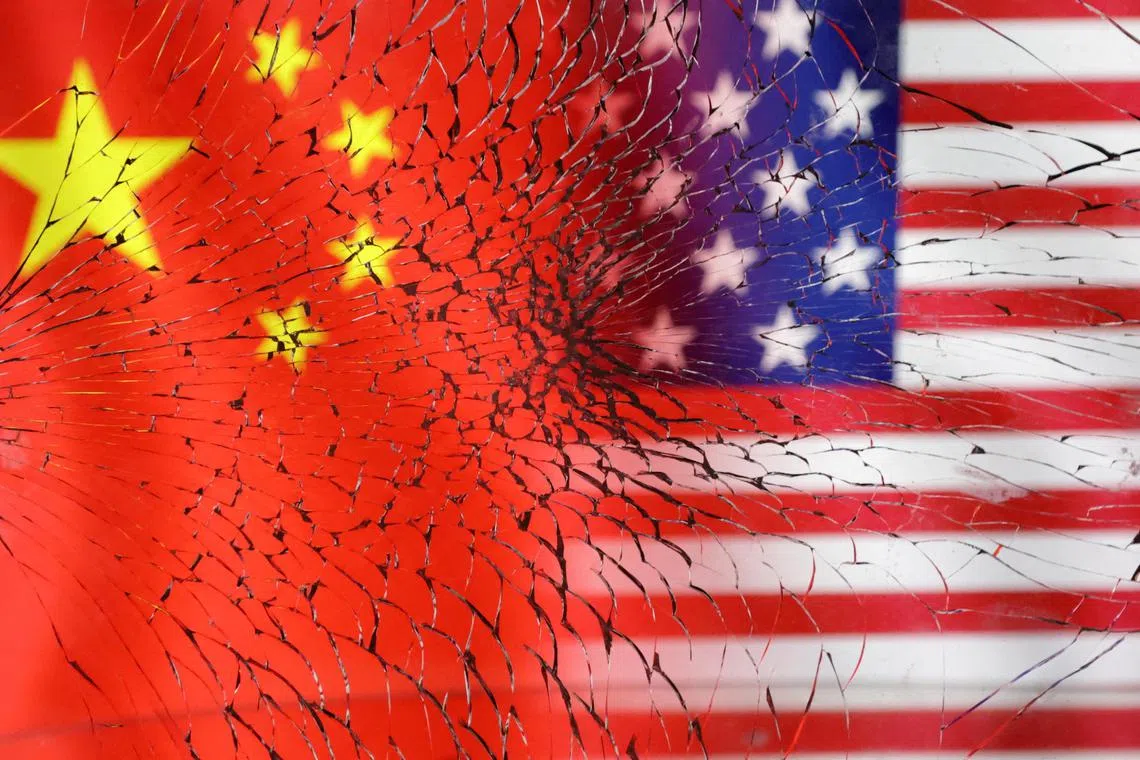Rising temperature between US and China must be cooled: Ng Eng Hen
Sign up now: Get ST's newsletters delivered to your inbox

The issue of Taiwan might cause a physical confrontation, even if neither superpower wants one.
PHOTO: REUTERS
SINGAPORE – The temperature between the United States and China has not reached boiling point, but it is rising
Speaking at the 59th Munich Security Conference on Friday, he added that the issue of Taiwan
He cited moves by both sides that could be seen as building up towards a war, such as recent US access to more bases in the Philippines China’s increased military presence in the South China Sea
While such “pre-positioning” for deterrence is alive and well, the war drums have not started beating audibly, said Dr Ng at the high-level conference, a major annual event for defence and foreign policymakers.
A war in Asia will be devastating, not only for Asia but also globally, he noted. “The reasons for war do not justify any in Asia. The stakes are not worth it, the consequences are disastrous and viable alternatives do exist.”
World leaders attending the three-day event at the Bayerischer Hof Hotel include US Vice-President Kamala Harris, top China diplomat Wang Yi
This is the first such conference since the Ukraine war broke out in late February 2022. The previous meeting was held as Russian troops gathered at the border with Ukraine.
US-China ties have been experiencing heightened tension in recent weeks, as the fallout over the shooting of a Chinese balloon
Dr Ng, who was speaking at a closed roundtable session alongside other officials such as Philippine Foreign Secretary Enrique Manalo and China’s former vice-minister for foreign affairs Fu Ying, said his speech was structured around two key questions.
Is a physical conflict between the US and China inevitable in the next decade? When it occurs, what would be the likely casus belli – cause or justification – for war?
He noted that both US President Joe Biden and his Chinese counterpart Xi Jinping have said that their countries do not seek conflict – which Mr Biden reiterated after the downing of the Chinese balloon.
But military leaders from both sides have not been so circumspect, noted Dr Ng. For instance, a US general recently wrote an internal memo about preparing for a conflict in 2025.
Former vice-chairman of China’s Central Military Commission Xu Qiliang also urged the People’s Liberation Army (PLA) to maintain a high-readiness posture, after the Communist Party’s 20th party congress in October 2022.
Dr Ng cited developments that could be read by the Chinese as preparation for war.
Examples are the formation of the Quad – a dialogue grouping comprising the US, Australia, India and Japan – and the Aukus security partnership among Australia, Britain and the US that was announced in 2021.
The US has also endorsed building up Japan’s counterstrike capabilities, and recently secured access to four additional military bases in the Philippines.
China’s defence spending has gone up – the 2022 defence budget was US$229.5 billion (S$306.7 billion), a year-on-year increase of 7.1 per cent and the seventh year of continuous growth, said Dr Ng.
There are almost daily patrols by the Chinese coast guard at key disputed features across the South China Sea, he added, and Chinese fighter jets regularly cross the median line in the Taiwan Strait.
A move towards Taiwanese independence will trigger a conflict. Accidents or incidents can also occur, said Dr Ng, who is attending the Munich Security Conference for the 11th time.
There have been close calls recently, including the recent shooting of the Chinese balloon that the US said was meant for surveillance. In December 2022, a PLA Navy fighter jet came within 3m of a US Air Force surveillance aircraft
“We are not in a comfortable place. The temperature is not boiling but certainly rising. We must do all we can to cool it,” he said.
Dr Ng, who is in Munich from Friday to Sunday, is expected to engage with young leaders from different countries at the forum and meet his foreign counterparts.


